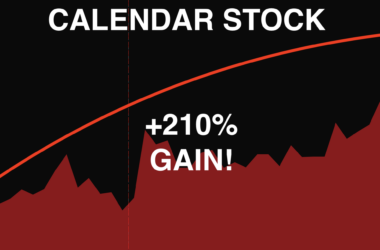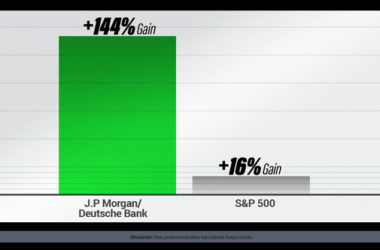Happy Monday, traders…
Jeff here.
If you’re struggling to make consistent profits in this choppy market, it’s time to pay attention…
I’ve trained a lot of traders throughout my 25-year career.
Unfortunately, I’ve seen students throw in the towel and quit right before they’re about to make a major breakthrough.
It’s usually like a little trigger — an ‘a-ha moment’ of sorts…
It’s a switch that goes off in your brain, turning your mediocre trading into a consistently winning strategy.
For a lot of you, this comes down to identifying your ‘Achilles heels’ — a single vulnerability or weakness in your trading.
EXAMPLE: I love to golf and I’m always trying to improve my game…
Years ago, I met a pro golfer who gave me one simple tip to help me not slice the ball, which changed my swing forever.
Thanks to this one adjustment, I’ve shot a lower average ever since — and won a variety of golf bets.
So, if you have one negative aspect of your trading that’s tripping you up, let me show you how to start correcting it today…
My ‘Achilles Heel’ (and How I Overcame It)
No one comes to the stock market fully formed, crushing every trade on the first day. No trader is perfect. No setup lasts forever.
Most traders have some sort of ‘Achilles heel,’ preventing them from reaching their ultimate potential.
For example: I know my Achilles heel is that I get overconfident and oversize my trades…
I want to sit at the ‘biggest boy’ table at the casino … all night, during every game.
In the past, this tendency had led to some dangerous, risky scenarios in my trading.
But after 25 years of professional trading (and constant self-evaluation), I know what works for me.
Having a keen self-awareness of my strengths and weaknesses allows me to pick and choose my position sizes based on specific criteria.
I used to let my overconfidence get the best of me. But now, I have the experience to avoid most of these situations entirely.
And just like I know myself, you must know thyself…
7 Common ‘Achilles Heels’ for Traders
With that in mind, let’s go over seven common ‘Achilles heels’ aspiring traders face (and how to overcome them)…
Perfectionism
Perfectionism is the arch-nemesis of excellent trading. Think about it — you don’t get an award for getting the perfect trade. If I nail an ideal exit on a position, nobody shows up at my house with a blue ribbon and says, “Jeff, you got the absolute to-the-cent high on Microsoft!” It just doesn’t happen like that…
Over my 25 years of professional trading, I’ve learned to forget about perfectionism. Exiting a trade, say, five cents below that perfect price gives me almost as much money without any international acclaim or recognition.
Get in there and start trading — just do it. Put a small position on. Be nimble, pulling little pieces out of the market organically. You’ll end up in the correct position when you’re in the action — in that flow state. On the other hand, if you strive for perfection, you might find yourself freezing up — not knowing how to proceed.
Poor Risk Management
Even with a sound strategy, a lack of risk management can turn potentially winning trades into devastating losses. Risking too much capital on a single trade or failing to use stop losses can expose you to excessive downside risk.
When you don’t have a plan to protect your capital, a sudden market move in the wrong direction could wipe out weeks or months of gains in just one trade. Implementing strict risk management rules — such as setting proper stop losses and never risking more than you’re willing to lose — is essential to preserving your account.
Failure to Adapt
Markets are always changing … what works in one environment may not work in another. Sticking to a strategy that thrived in a bull market may not be effective during periods of volatility, consolidation, or a bear market.
If you fail to adapt to these shifts, you might find yourself leaning into strategies that are no longer profitable. Being aware of the broader market context (and adapting your approach accordingly) is crucial for long-term success.
Emotional Decision-Making
The emotional rollercoaster of trading can lead to rash decisions that harm your profitability. Fear may cause you to hold onto losing positions longer than you should, hoping for a turnaround, while greed may lead you to sell winning positions too early, missing out on potential gains.
Managing these emotions and sticking to your strategy — regardless of how you feel in the moment — is crucial for staying on track and executing trades effectively.
Embrace discipline, reject emotion.
Confirmation Bias
Confirmation bias can blind you to the potential risks and prevent you from making objective decisions. Once you’re committed to a trade, you might unconsciously seek out information that supports your position while ignoring any evidence to the contrary.
When you only see what you want to see, you’re less likely to cut your losses or adjust your position when the market turns against you. Being aware of this bias — and actively seeking out opposing viewpoints — can help you maintain a more balanced perspective and make objectively better trading decisions.
Chasing the Lottery Ticket
Buying cheap, out-of-the-money options in hopes of striking it rich is like buying Powerball tickets — it’s an enormous long shot. But I get the allure. Sometimes, traders can’t help but look at the ‘max profit’ on a trade and think they will instantly bank it.
The possibility of hitting it big can be tantalizing, but the reality is that these contracts usually expire worthless. And if you continually go for these types of trades, you’re far more likely to lose all of your money than make 1000% overnight. Steer clear of contracts that are super far out-of-the-money (OTM), or expiring that week.
Try to get on the fairway as opposed to hitting a hole-in-one.
Unrealistic Expectations
Many options traders enter the market with dreams of getting rich quickly, which can lead to taking unnecessary risks. You might overtrade or enter larger position sizes than you should in pursuit of “easy money.”
These unrealistic expectations often result in recklessness, leading to significant losses. Trading is a skill that requires passion, patience, and perseverance to achieve consistent profitability.
Slow and steady wins the race.
If any of these seven common problems sound familiar to you … it’s time to take a step back, evaluate your performance, and eliminate your ‘Achilles heel’ once and for all.
Happy trading,
Jeff Zananiri
P.S. Wall Street is making fatal mistakes … and it’s time for us to take advantage.
If you can spot these glitches in real-time, you could enter these “artificially cheap” trades right after they crash — and before they skyrocket — for gains of 51%, 107%, and even 630% … in less than 24 hours.*
TONIGHT, August 19th, at 7 PM Eastern, I’m sitting down with legendary mentor and trader Tim Bohen to reveal Wall Street’s dirty little secret — The 24-Hour Glitch.
So, if you want an inside look at the AI-powered system that’s turned Wall Street’s biggest weakness into my greatest strength…
Click here now to reserve your seat!
*Past performance does not indicate future results




